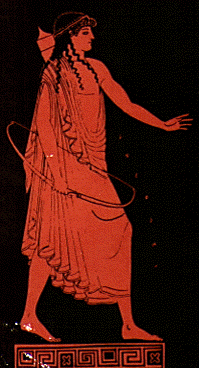A Historical Perspective: Ancient Theories
Aristippus and Epicurus
Berlin Painter. Apollo (490 BC) 
-
Epicurus (341-270 BC)
-
Pleasure = "the abscence of pain in the body and trouble in the soul. It
is not an unbroken succession of drinking feasts and of revelry, not sexual
love, not the enjoyment of fish and other delicacies of a luxurious table
that produce a pleasant life; it is sober reasoning, searching out the
grounds of every choice and avoidance, and banishing those beleifs through
which the greatest tumults take possession of the soul".
-
All pleasures are 'good', and the aim of life is to maximize pleasure.
-
Pleasures differ in intensity and durability.
-
There are 2 major classes of pleasures:
-
Motion-based: Body related, acute, transient.
-
State-based: Mind related, spread in time (ex mood).
-
The best life involves a continuing, state-based, mind-related,
'generalized' pleasure.
-
The mind has the capability of recalling (introspecting on) past pleasures,
and experience them in the present.
-
The Soul has an irrational part (distributed in the body) and a rational
part (in the chest).
-
The experience of emotion is an indication of Truth.
-
Since the feelings about objects are true, they must be common to all tribes,
but different from region to region, therefore feelings are at the origin
of language .
-
Aristippus (435-356 BC)
-
Founder of hedonism.
-
Like Epicurus: All pleasures are good and should be maximized.
- Like Plato: All pleasure consist in motion
(of the psyche).
-
The best life involves a succession and accumulation of pleasures.
Author: Jean-Marc Fellous
